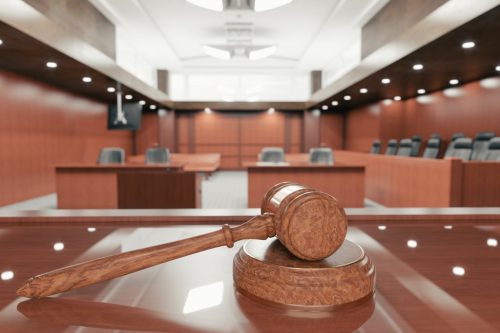

By Kaylee Pearlman
WASHINGTON, DC – Three U.S. Supreme Court justices stated the court’s majority last week to not to hear the case of a Tennessee death row inmate was “disheartening,” according to a story in LAW 360 by Marco Poggio.
Kevin B. Burns, writes Poggio, was “sentenced to death for taking part in a 1992 shooting that killed two men,” but, this sentence “has been clouded by claims of ineffective counsel,” although he notes no date has been set for Burns’ execution because of a temporary halt to Tennessee executions.
In order for Burns to be convicted of felony murder “the jury only had to find that he participated in the robbery…determining who actually pulled the trigger was crucial in determining his sentence,” and in 1995, a “jury….[found] evidence of an aggravating factor—that he knowingly created a risk of death to two or more persons other than the victims murdered,” Poggio states.
Poggio reported the “state jury convicted Burns of two counts of felony murder for taking part…in an ambush where six men shot another group of four men,” adding the victims were robbed of their “money and jewelry.”
“Two of the six men fired rounds that killed Diamond Dawson and Tracey Johnson,” and also wounded were Eric Thomas and Tommie Blackman, Poggio adds.
Poggio explains Burns was “the last person to be prosecuted for the killing,” and “his co-defendants were sentenced to life in prison.”
In 2006, Burns “claimed his trial counsel was ineffective to the point of violating his Sixth Amendment rights to a fair trial,” and his lawyers “failed to impeach two of the prosecution’s key witnesses,” reported Poggio.
Those witnesses were, “Thomas, who…had told police another man in his group had opened fire; and Mary Jones, a neighbor who identified Burns in the courtroom as the man wearing a Jheri curl hairstyle..though Burns wore his hair short at the time of the shooting,” states Poggio.
“After reviewing the case, the Sixth Circuit found that Burns’ ineffective counsel claim was meritless,” wrote Poggio.
But SCOTUS Justice Sotomayer said “the error in the Sixth Circuit’s decision leaps off the page…evidence that Burns did not shoot the victim is not…mere residual doubt evidence,” adding, “the court should have acted to reverse the effect of an ‘erroneous’ opinion by the U.S. Court of Appeals for the Sixth Circuit” but denied “Burns a chance to challenge his capital sentence.”
“The need for action is great because Burns faces the ultimate and irrevocable penalty of death…With so much at stake, I would vacate the decision…and remand,” argued Justice Sotomayer, according to the LAW 360 story.
Justices Ketanji Brown Jackson and Elena Kagen also dissented, “because the court refuses to do so, the indefensible decision…will be the last for Burns,” reported Poggio, adding “Burns’ cert petition was his last chance to get relief in the court system…only a pardon by the state’s governor could spare Burns from execution.”
In an amicus brief noted by Poggio, a group of ordained and lay Christian ministers said that “this case illustrates the need for competent counsel to present mitigating evidence in capital sentencing…both witnesses who identified Burns as Dawson’s killer could—and should—have been impeached on their identification.”
Justice Sotomayer, Poggio wrote, added, “Burns’ case reflects the kind of situation where the court has intervened before…one where the underlying relevant facts are not in dispute, where lower courts’ decisions conflict with Supreme Court precedent.
“The court’s decision to deny certiorari means that Burns now faces execution…acting on incomplete information, sentenced him to death because they thought he had [shot Dawson]” Justice Sotomayer said in the dissent.
Brandon L. Garrett, a habeas corpus scholar and professor at Duke University School of Law stated in an email to LAW 360’s reporter about “striking the lack of preparation by Burns’ trial counsel, in particular considering that he was facing the death penalty. If the Supreme Court is not often going to grant certiorari in cases raising serious questions whether habeas relief was improperly denied…
“Then that tends to encourage lower courts to be less careful in denying relief to meritorious claims,” Garrett concludes in his email, wrote Poggio.
Richard L. Tenet, a federal public defender who represents Burns, stated in an email to Poggio that his client “has been sentenced to death for a killing he didn’t commit,” calling Burns a “remarkable man who made strides towards rehabilitation during his time in prison.”
Tenet said, according to Poggio, “three justices of the United States Supreme Court were willing to do the extraordinary, and to grant summary relief to Kevin Burns…our modern federal court system is not designed to address matters of mercy and redemption, or even to correct errors of law, and the other six justices followed long-standing legal practice and refused to intervene.”
Tenet adds that “the six-justice majority decision not to hear Burns’ case signals the court’s overall displeasure in wading through capital cases. The responsibility for relieving an inmate of an unjust sentence of death lies not with the federal courts, but with the governor through clemency,” per Poggio’s reporting.